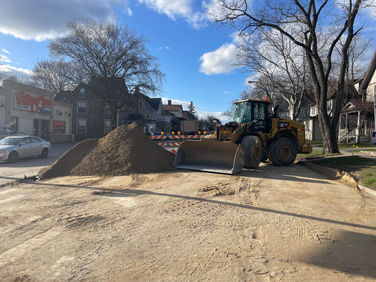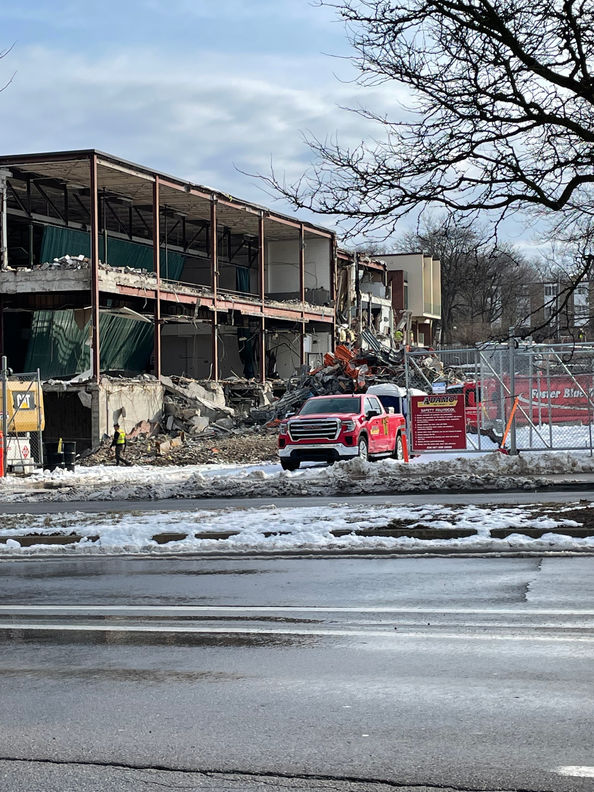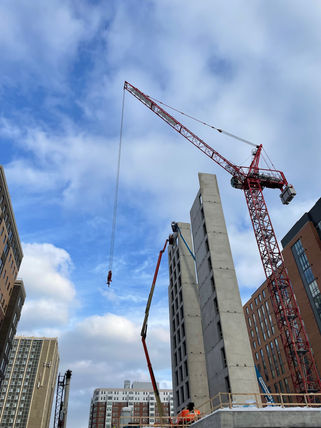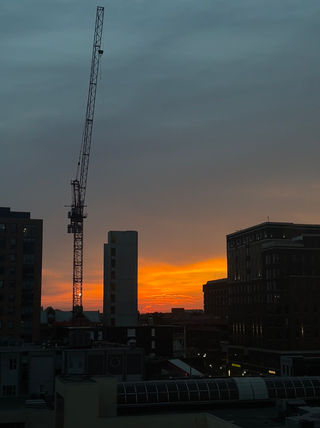MONO NO AWARE


An Ode to Campus Construction
I like all of the construction on campus. No really, I do. But not in a masochistic, “what’s wrong with him?” way – I don’t delight at sidewalks closed, or write poetry about chain link fences blocking off sections of campus for indeterminate lengths of time (eons). I don’t cheer every time I walk by an idle jobsite, reveling in workers paid to do their jobs at a snail’s pace. I don’t stand, arms outstretched, welcoming an aggressive blast of construction dust straight to my face and clothes as I walk to class. In fact, there’s a piece of campus construction closing off my most convenient route home. And every time I have to take the right turn specified by the orange “DETOUR” sign, I stare daggers at their progress outside my car window, willing them to be finished sooner.
But the other night, I walked by that very same piece of construction. I peeked over the orange plastic temporary fence they had cordoning off their work, curious about what had been giving my commutes home so much grief. And there was a massive hole in the ground, exposing some sort of pipe, presumably soon to be replaced. And for a moment, all of my disdain evaporated, because I just thought it was so cool. That piece of road, which I had driven over so many times, was now completely and totally different. That massive ditch had turned the road, something mundane, into something interesting. I would’ve paid movie theater ticket prices to sit out there with popcorn and watch heavy machinery carve out that section of pavement. And so while that detour is still irritatingly inconvenient, I at least take enjoyable solace in that whatever they’re doing down there looks very cool.
Me finding a large hole in the ground exciting can be blamed on my childhood. My mom was under the impression that raising children was easy, because all she had to do to keep her oldest occupied was put my high chair in front of a street-facing window, give me some Cheerios, and watch as I gleefully exclaimed “Broom broom!” at each motor vehicle that trundled by. My fascination with cars naturally extended to the biggest ones I could find: construction vehicles. One of my grandma’s go-to activities was taking me on a drive to her town’s nearest construction site, where I’d sit and watch with rapt attention. And if my grandma confused an excavator for a skid steer, or a bulldozer for a backhoe, little me would make sure to let her know how exasperated I was at having to correct her again.
Looking at construction now still recaptures some of that childhood joy, and it’s part of why I like campus construction. Now someone doesn’t even have to drive me anywhere to see it – it’s right on my doorstep. Last winter semester, getting out of bed for my 8:30am class was only bearable because I knew I’d get an amazing view of the complete and utter demolition of my campus’ recreation center, an old dinosaur of a building constructed in 1954 and erased in 2023 over a few short weeks. Last year I also watched from my own apartment as a new high rise apartment building went from stone staircases and elevator shafts sticking up into the sky to an actual building – except I really didn’t. By the time I left Ann Arbor for the summer and returned for my senior year, the construction that had been a constant companion outside my window looked more like an apartment than the fledgling project I had known. It was like visiting home after months at school and confronting the fact that my youngest sister was growing up before my very eyes. But just like the new high rise, my eyes had missed the middle part, and she’d jumped straight from little sister to high schooler.
I’m also aware that people’s dislike of campus construction extends to matters beyond aesthetics or inconveniences. Writing for The Michigan Daily, Ethan Bittner describes how places like Angelo’s, a beloved breakfast spot, or Pinball Pete’s, a place for classic arcade fun, make Ann Arbor unique. But with the former closed, awaiting demolition to make room for a new University of Michigan building and the latter currently threatened by a new apartment building proposal from Landmark Properties, the college town feel of Ann Arbor is in danger. According to Bittner, construction projects that come at the expense of iconic Ann Arbor locations “only harm [its] charm and the unique spaces that are essential to the University of Michigan community” (Bittner par. 11). And while I agree with his point, there’s a sense of inevitability to Ann Arbor’s evolution. Stephen Vangelatos, the owner of Angelo’s, received $4.5 million dollars for the sale of the land upon which his now-abandoned restaurant stands. The fact that I, and so many others, loved Angelo’s couldn’t compete with that figure.
Construction on campus reminds me of a term I learned about in a psychology of mindfulness class: mono no aware. It’s a Japanese phrase, and depending on where you look, it translates to sentiments similar to “the beauty of things passing”, or recognizing and appreciating the impermanence of all things that exist in our world. Mono no aware’s relevance to Angelo’s is clichè, and only poor comfort for those of us who miss their breakfast more than we want to appreciate the beauty of its impermanence. And it’s totally cool to feel that way. But the next time I walk by the skeletal girder frame of the new campus recreation center, or the soon-to-be-completed high rise that I saw in its infancy, I’ll appreciate the beauty of something brand new being constructed before my eyes, and how even those state of the art projects are just as impermanent as the demolished buildings they replaced.
The notion of mono no aware has also guided the project you’re about to experience. I’ve undertaken the (sometimes horrifying) effort of looking back at old pieces of my writing, from sixth grade to my time at college. In some cases, I’ve rewritten them and reflected on that experience, and for others I’ve simply reflected after a reread. My work, old and new reacting to each other, will recognize and celebrate change – exploring the beauty of things passing.






